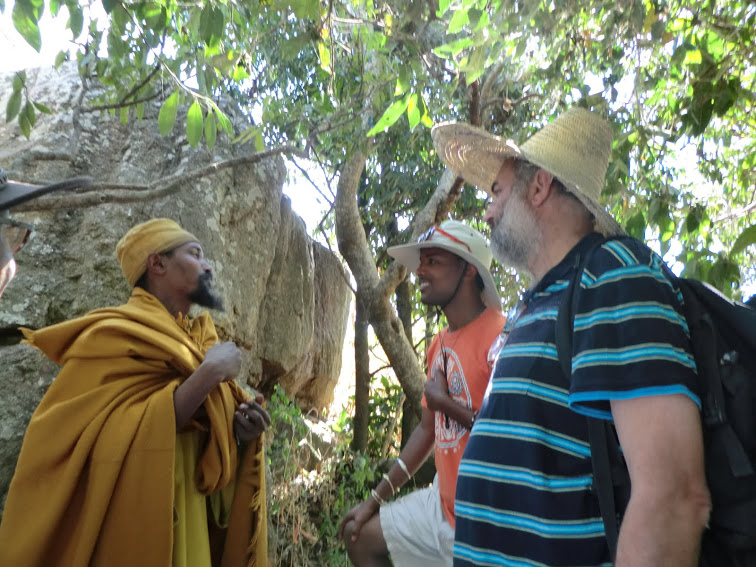9 January 2013
[From last year’s family trip to Ethiopia. I’m preparing to go back to Ethiopia in a few weeks, and suddenly remembered our encounter with the monk, Son of Gabriel.]
Each new place we visited in Ethiopia added another piece to the puzzle, and at the same time made the puzzle more complex . We left the lakeside town of Bahr Dar early in the morning, and after a three-hour boat ride on Lake Tana we eventually arrived, seasick, at the island monastery of Tana Cherkos. An old monk showed us around (after a barefooted novice took Ima to the side: women were not allowed on the island). The island, he claimed, was where the Ark of the Covenant was kept on its way from Jerusalem to Axum. He showed us the holes the tent pegs were placed in, the holes where the poet-saint Yared mixed his ink, the Jewish sacrificial altar for the Jewish blood ceremony… at this point our guide, Casa, told the monk – whose name was Son of Gabriel – who was reverently referred to as Aba – that Aba – my Aba – was a Jewish rabbi – that is, a Jewish priest. And then started the Disputation.
“What do you do in a synagogue?”
“We pray and read the Torah.”
“And sacrifice?”
“No. Since the temple was destroyed, we read about the sacrifices but don’t do them.”
A long bout of translation and discussion ensued, and then Casa summarised: He understands that since the Ark of the Covenant is in Ethiopia, you cannot perform the sacrifices. To which Aba agreed.
“Do you keep the ten commandments?”
“We keep 613 commandments. The ten, and Leviticus, and circumcision – all the commandments that we can keep without the temple.”
Son of Gabriel remained pensive as he showed us the tomb of the priest Azarias, and then asked us about the Israelite priests’ function today.
“The priests today bless the people.”
He smiled victoriously, and said: “Rabbi, I know that there is the Holy of Holies, and the High Priest stands there blessing the other priests waiting in the outer courtyard, and only then those priests bless the people. How can your unclean priests bless anyone without the Holy of Holies?”
Here Yoni jumped in, slightly aggressively, and explained that he was describing the Yom Kippur purification, not the priestly blessing. Again, furtive discussion in Amharic ensued, questions were asked, and we settled the matter thus: Because they are the sons of Aaron, they still have the power to bless. And so it was.
(I realise only now that it wasn’t obvious to the Son of Gabriel that the temple in Jerusalem had ever been destroyed, and the temple rites abandoned. I wonder what the new knowledge did to his faith.)
He continued showing us around the island: the places where the monks meditate privately, the tef fields that they sow and reap, the seeds they gather, the bell made of basalt that calls them to prayer seven times a day, the church made of wood and tin, shaped like Noah’s Ark, the footprints of Mary miraculously imprinted in the rock. I asked how long they slept each night, and he explained that a monk lives his life in gedam, a state of wilderness, apart from the world. Like Jesus who spent 40 days in gedam and mastered the temptations of the devil, offering him power, wealth and death, so too do the monks deny worldly excess, they eat little, sleep an hour or two a night, and never die – they simply disappear, and lights hover around the island at night, ancient monks, perhaps, who live purely in gedam, and have rejected even their body.
The Son of Gabriel took us into a small hut, and proceeded to show us remains from the temple that had been brought over to Ethiopia and left behind on the island. A priestly breastplate, to hold back the white robes as he sacrificed the lambs, a stick with seven hooks to hold the parts of the flesh as they were burned, a priestly stick, two metal structures with adjustable teeth to hold seven oil lamps between them – the Holy Menorah. We stood there incredulous. Then he stopped the explanation, and asked:
“I ask you, Rabbi – you say you follow the commandments of the Old Testament. But it says there that you must cut off the hand of the thief, and pull out an eye for an eye that is lost. Do you do this?”
“Let me explain…” And he did. Aba, my Aba, told the other Aba about the written Torah and the oral traditions that accompany it, that a hand and an eye are the value of a hand and the equality of an eye, and the Son of Gabriel was pleased.
“I was testing you. We also have this tradition, this understanding,” and he gave the example of the New Testament verse ‘Be not like the Pharisees, when your right hand gives, the left hand need not know’, meaning that a wife shouldn’t know about her husband’s charity.
(Again, retrospectively, I think that it wasn’t accidental that he chose the example that began ‘Be not like the Pharisees.’)
We spoke a little more, Yoni asked how they understand the Temple in Jerusalem continuing after Solomon if the Ark was in Ethiopia, he said that they left behind a replica. We finally left the island, with gifts of holy bread, both sides convinced in the truth of their faith.
